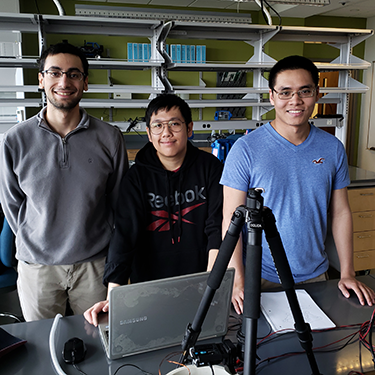.png)
Nhi Ngo, a senior majoring in statistics, says the team project improved her ability to be open-minded about new suggestions and feedback.

A senior design team with the Department of Bioengineering worked together to create a software control interface for a system that could one day help doctors guide magnetic particles through the body for surgical and targeted drug delivery applications. Pictured here from left to right: Bassam Mutawak, Victor Huynh, and Minh-Quan Do. Not pictured: team member Elizabeth Ankrah.
Mason Engineering seniors refined their research abilities, polished technical expertise, and developed better communication skills during their two-semester senior design projects.
Bassam Mutawak, a bioengineering senior, was part of a team that created a software control interface for a system that could one day help doctors guide magnetic particles through the body for surgical and targeted drug delivery applications.
“I learned how to develop software with a group, which is different from writing it by yourself,” he says.
Mutawak and his three teammates taught themselves the C++ programming language for their project, sponsored by Weinberg Medical Physics in Rockville, Maryland.
His team and about 40 other groups and individuals will share their projects at the Volgenau School of Engineering’s sixth annual Undergraduate Research Celebration on Tuesday, April 16 from 5:30 to 8:30 p.m. in Dewberry Hall in the Johnson Center.
Many engineering undergraduates work in teams on senior design projects, tackling complex research ideas that often are sponsored by companies and government agencies.
Students say the experience taught them to:
- Communicate clearly. “When working quickly, I assumed everyone was on the same page on a possible software problem, but that assumption caused confusion later,” Mutawak says. “I learned that communicating the problem that needs fixing is just as important as articulating the solution itself.”
- Plan ahead. There are always unexpected struggles when tackling a big project, says bioengineering senior Victor Huynh, one of Mutawak’s teammates. “Looking back, we could have saved a lot of time and been more productive if we had planned better.”
- Listen to everyone. It’s important to encourage people who are naturally quiet to speak up, because they may have the best ideas, says Brandon Goodrich, a mechanical engineering senior who was part of a 14-member senior design team. The group, with representatives from three departments, worked on three experiments that are being integrated into one small satellite. “Getting everyone to speak up encourages out-of-the-box thinking and stimulates project growth,” he says.
- Take feedback to heart. “The experience has helped me polish my ability to be open-minded about new suggestions and feedback,” says Nhi Ngo, a senior majoring in statistics. Her team is trying to identify which socioeconomic factors, such as poverty, unemployment, and single household rates, might contribute to an increase in opioid-related overdoses and deaths in Virginia.
- Stay on top of your work. Deadlines come up faster than you realize, so working ahead is always prudent. It's important not to get bogged down, says computer engineering senior Gerald Evans, whose team created a virtual reality game for the students in Mason LIFE, a post-secondary program for young adults with intellectual and developmental disabilities. “Doing something every day makes the workload easier in the long run, even if it means doing something small that only takes a few minutes,"
- Meet a client’s needs. “This project taught me a lot about designing with a specific client in mind, instead of purely technical specifications,” says electrical engineering senior Caitlin Fitzsimmons, who also worked on the virtual reality game project. “Usability became an important design factor.”
